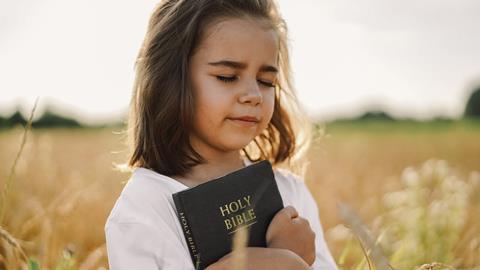Elaine Storkey reveals how the Old and New Testaments depicted children and why we need the same care and consideration for them today
I wonder if you were ever given a children’s Bible, or bought one for a child you know? Today, they come in dozens of different editions, adapted for age groups from toddlers to teens. Whether they cover the whole biblical text, pick out key stories or focus on the life of Jesus, they’re designed to communicate God’s word to hungry young hearts.
Children in the Old Testament
Children are significant in God’s view of the world. And when children read their brightly coloured editions of the Bible, they find stories of people their age, often called by God for special tasks. Especially in the Hebrew scriptures, these young people jump out of the text and become real for us all. Who can forget the story of Miriam, who watched over Moses, her baby brother hidden in the bullrushes, so that he would not be murdered by Pharoah’s soldiers (Exodus 2)? Or Samuel, asleep in bed, whom God woke by calling his name three times, and asked him to bring a word of prophecy to Eli the priest (1 Samuel 3)? God knew these children and chose them. And there are more—Isaac, Ishmael, Joseph, Benjamin, Naaman’s servant girl, and Daniel join Miriam, Moses and Samuel as having an important place in God’s plan for his people.
It is not only through children’s stories, however, that the Old Testament shows the importance of young lives. Many biblical authors speak about the meaning of childhood and how children should be nurtured and cared for. The books of the Pentateuch*, the Psalms, Proverbs, the Prophets and other writings all have things to teach us in our relationship with the young. For they give adults the responsibility to pass God’s truths on to the next generation; truths that are moral, relational, practical and spiritual. These are principles that God has breathed into the human creation, so that we might walk with our Creator and live peaceful, empowered lives.
There’s to be no apathy. We have to ensure the spiritual wellbeing for future generations
The urgency of this comes over strongly in the Law books, especially where we are told to be persistent about teaching God’s ways: “Teach them to your children, talking about them when you sit at home and when you walk along the road, when you lie down and when you get up” (Deuteronomy 11:19). There’s to be no apathy. We have to ensure the spiritual wellbeing for future generations. Some of the psalms pick up the same theme: “I will open my mouth with a parable; I will utter hidden things, things from of old – things we have heard and known, things our ancestors have told us. We will not hide them from their descendants” (Psalm 78:2-4). Not only does this bless the children who hear, but the next generation get to know them, “even the children yet to be born, and they in turn would tell their children. Then they would put their trust in God” (vv6-7).
All these verses show us that parenting and guardianship are vital. We have the responsibility to protect and teach young people so that they and the generations who follow will live well. It’s through us that good ways of living and knowledge of God’s truth will continue through years to come.

Children in the New Testament
The same attitudes are echoed in the New Testament. The Gospel writers tell their own stories, especially about the way Jesus welcomed and blessed children – even when his own disciples thought them unimportant and wanted to send them away (Mark 10:13-16). They tell us about the children who were healed. The precious daughter of Jairus was reported as dead, yet Jesus, in compassion, brought her back to life (Luke 8:41-42,49-56). The son of a royal official (John 4:46-54) and the daughter of a Canaanite woman (Matthew 15:21-28) were also healed by Jesus spectacularly; both of them at a distance. Jesus’ power and love reached the children without him even physically seeing them.
We find stories of children in the early Church too. We encounter Rhoda, a servant girl who was with the group of people praying that Peter might escape from prison. She answered the door and found Peter standing there, having been miraculously released. Yet, her excitement was so great that she ran to tell the praying disciples, without first opening the door to let him in! (Acts 12:12-15). We read the story of another youngster, Eutychus, who became so tired during Paul’s very long sermon in the upstairs room, that he eventually dropped asleep and fell from a third-floor window (Acts 20:7-12). Thankfully, Paul had a healing as well as preaching ministry, and restored him to life! In addition, we discover four girls in Acts who had the gift of prophecy – daughters of the apostle Philip (Acts 21:8-9).
As in the Hebrew scriptures, stories in the New Testament go alongside the teaching. Jesus himself taught much about children, constantly advocating respect for them. He endorsed their value and importance, and emphasised their vulnerability and dependency. He also echoed the familiar Hebrew teaching that responsibility for their welfare and wellbeing is placed firmly on the shoulders of adults.
Jesus did this both practically and symbolically, for example when he laid hands on their heads and blessed them, or when he took a little child into his arms and said to his disciples: “Whoever welcomes one of these little children in my name welcomes me; and whoever welcomes me does not welcome me but the one who sent me” (Mark 9:36-37). This was such a powerful endorsement of God’s heart for children. Jesus even suggested that children’s humility and trust should be a role model for adults, for unless we become like little children, we will never enter the kingdom of God (Matthew 18:2-4). Jesus also gave an intense warning to those who would harm children, or “cause them to stumble” (Matthew 18:6).
It’s not surprising that St Paul applied Jesus’ teaching on children in his Epistles to the churches. He told children in Ephesus that their responsibility was to accept parental guidance and to honour their father and mother. Yet, like Jesus, he stressed family obligations work in both directions. He singled out fathers and told those in Ephesus not to exasperate their children, but to bring them up with good discipline and instruction (Ephesians 6:1-4). He took up the same theme with fathers in Colossae. They were not to embitter their children or they would become discouraged (Colossians 3:21). Such good advice; these reminders would not be out of place in many families today.
How does this all relate to us today?
We live in an era when a biblical view of childhood is under severe pressure, and where parenting can bring anxiety and many dilemmas. Among older children in the UK, one in four now suffer mental-health issues – an enormous rise from previous decades. Children are exposed to so much that is adult, whether through the internet, identity crises, separation or early sexualisation, that many are thrust into an adult world prematurely. Targeted advertising, porn, internet bullying and manipulators intent on grooming make children even more vulnerable. Some parents struggle as they feel that their responsibility for their children is becoming diminished by laws that give children greater autonomy and privacy. At the same time, lawmakers and childcare services have to increase child safeguarding measures, as reported child sexual abuse cases now have risen beyond 100,000 a year.
Our culture often projects misleading images of children. Today’s young people are vulnerable. They’re not mature, autonomous, independent or self-sufficient. As scripture reminds us, they still need to be nurtured. Children are learning; copying, responding, absorbing, growing up and maturing under guidance from others. And this remains true, whoever is exercising that guidance. Absentee, negligent or abusive guides are also providing guidance, but with terrible indifference to what children really need. We read so many sad stories of young people being guided badly, sometimes misled by people they respected. We know too from thousands of case studies, that the hurt and damage caused in childhood can leave people with problems of trust and self-doubt for years to come.
So, the biblical view of children, and especially the compassion and respect that Jesus showed all those he interacted with, is desperately needed in our day. And those children who find their security and identity in Jesus know God’s love and power sustaining their lives; we pray that they, too, will pass God’s truth down to generations yet unborn.
*Refers to the first five books of the Bible.

































No comments yet